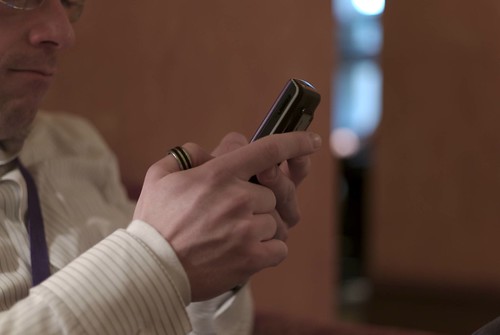I currently have to deal with five hours or so of email a day and each day is packed with meetings, many as short as 15 minutes and 1 hour meetings being booked only in extraordinary circumstances. I have a list of 100 or so names of people that I've promised to meet, many who are very angry because we haven't been able to even book a meeting on my calendar.
I aggressively turn down all kinds of request and am aggressively resigning from boards and other obligations, but each day, I receive a steady flow of meeting requests that I just can't turn down.
I've chosen this path and I'm not complaining about the fact that I'm busy.
My concern at the moment is that the urgency and the rate of inbound email requires that in addition to the 2-3 hours of email in the morning and the 2-3 hours of email in the evening, I must diligently triage email during the day. Right now, depending on how much of my attention is required in a meeting, I keep an eye on my email and direct partial attention to my device and not my meeting. As someone who (ironically) co-teaches a class on awareness, I realize that this is both rude and a very poor way to have an effective meeting. People who know me well have gotten used to it, but for many people, it's disconcerting and disappointing.
I've thought about what I can do about this. The obvious answer is to try to check email between meetings, but that would mean that I would have to reduce the number of meetings since my meetings are so short. I could also ignore more of my email. I'm already unable to respond to many important email requests and reducing my responsiveness in email would also cause harm. At some level this is just a matter of being completely overcommitted, and I am doing my best to try to deal with that, but I was wondering if there might be some clever way to deal with the "partial attention during meetings" problem.
One idea that I had was to schedule several hours of email time during the day interspersed with "no devices / full attention" meeting times. When someone signed up for a meeting, we would ask if they needed full attention and if so, they would end up in the "full attention slot" queue or get booked a month or so out when my next "full attention slot" was available. On the other hand, if all they wanted was for me to be available to provide opinions or make decisions as part of a broader meeting or if the person didn't mind my partial attention during meetings, we could book the meeting in a "partial attention" slot which could be scheduled sooner. I would use un-booked partial attention slots to catch up on email if no one wanted such a slot.
This feels a bit too clever by half and maybe difficult to communicate to a person not familiar with my problem.
The other idea that I had was just to ask at the beginning of a meeting, "do you want this to be a laptops closed meeting or do you mind if I keep my eye on urgent email and triage?" I'm not sure if everyone would ask for my full attention or if I'd have a selection bias where only people confident enough would ask for my full attention and that those people who really needed my attention but were too polite would end up with my partial attention.
Lastly, I could just be a bit more mindful in the meetings and try to read the room better. I am generally pretty good at figuring out when the meeting requires my full attention, but as anyone who has seen someone trying to do this knows, one probably thinks they are doing this better than they actually are and in any case, it appears disrespectful to anyone who isn't used to people in this mode.
Any suggestions? Any thoughts on my crazy ideas? I know many of you will say, "You're just overcommitted. Just say 'no' to more stuff." OK. I will and I am, but I think I will still have some variant of this problem even if I'm just replying to earnest questions from students that I think deserve some sort of response.
--
Update: I've decided to take Ray Ozzie and other people's advice and focus on clearing my inbox and getting things off my plate and not multitask during meetings. I'm now using Trello somewhat effectively with small team to help me with my triage and followup. It's mostly working, but I'm trying not to do email during meetings - unless I have some sort of emergency going on.
![Joi Ito [logo]](/_site/img/joi-ito-logo-300.png)





